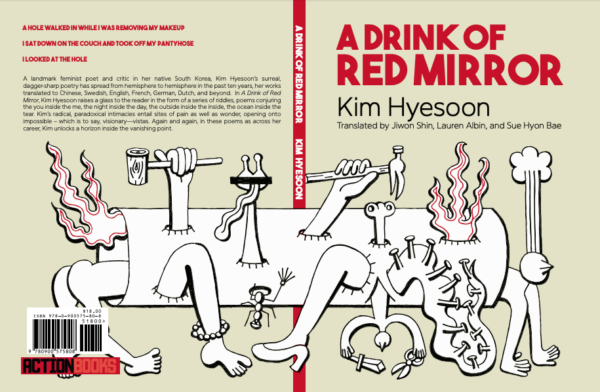
An interesting thing happened while I was working the Action Books table this year at AWP. An enthusiastic man approached the table and proudly announced, “I’m here for the new Don Mee Choi translation!” I eventually learned he was looking for Don Mee Choi’s translation of Kim Hyesoon’s Autobiography of Death, an exciting 2018 release from New Directions. His mistake was understandable. Action Books has published Kim Hyesoon’s Mommy Must Be a Fountain of Feathers (2008), Garbage of the World, Unite! (2011), and Sorrowtoothpaste Mirrorcream (2014) – all translated by Don Mee Choi.
While I took the time to point the man in the direction of the New Directions table, I figured I might as well also tell him that Action Books had recently put out Kim Hyesoon’s A Drink of Red Mirror (2019), co-translated by Jiwon Shin, Lauren Albin, and Sue Hyon Bae. He picked the book up off the table, paged through it quickly, and then said, “Very cool. But I’m only interested in Don Mee Choi translations.” I honestly didn’t know how to respond at first.
“So you like Kim Hyesoon’s poetry?” I asked. “Yes,” he answered. I responded, “Well, this book does contain notes from all three translators and Jiwon Shin even discusses a plurality of Kim Hyesoons.” The man stared at me blankly. I could tell his mind was made up. I think he did not want to purchase A Drink of Red Mirror because it was translated by translators he hadn’t heard of. Which brings to mind another question: Is there something about co-translated projects that make readers skeptical?
From Jiwon Shin’s translator’s note:
“On behalf of my co-translators, I humbly present A Drink of Red Mirror with deep appreciation for Kim Hyesoon. We are pleased to add to admirable accomplishments of Don Mee Choi. Her dedication to materializing Kim Hyesoon’s work in English has almost single-handedly sowed seeds that have begun to sprout, as reads of this compelling poet from South Korea emerge in succession across America and around the world.”
Having read the collaborative translators’ note between Sue Hyon Bae and Lauren Albin, I assure you: these are capable, thoughtful translators. They write:
“In every possible instance, we worked to produce an exact translation, meaning we adhered to the grammatical and linguistic stipulations of the original work, even when the poem seemed to be escaping its own basis and language was turned inside out. We avoided imposing on the poem by changing it into what we thought it should be. Instead, we let the work speak in its own language, followed it as we would a guide into the world of its fantasy, and like any good observer, worked to transcribe its truth on the page even when it pushed at the boundaries of our own language and seemed to overflow. Through translating these poems, we’ve felt duty-bound to represent as best as possible the artistry of Kim Hyesoon, her imagination, and the life of her poems on the page. The collection ends with the image of Kim herself ‘painting like a broken faucet’ against being forgotten. Having steeped ourselves in her voice during the four years we’ve dedicated to this project, our language for and perception of the world around us has been permeated and changed. We hope, in reading this translation of her work, yours will be too.”
Shouldn’t we want to read multiple translations of the same author-in-translation? Shouldn’t we want to approach a poet-translator as comprehensively as E. Tammy Kim does? Especially if one claims to be a die-hard fan of Kim Hyesoon? Shouldn’t we want to experience as many different translations of your favorite artist as possible? This may or may not surprise you, but a lot of judges of annual translation awards fully support limiting the number of translators involved in a potentially ‘prize-winning’ translation. In fact, there are some competitions with guidelines that explicitly state: “Books must have one or two translators at most.” According to this logic (?), A Drink of Red Mirror is not eligible to be considered a prize-worthy book-in-translation by some. Takako Arai’s Factory Girls, another recent Action Books title edited by Jeffrey Angles, has also been deemed ineligible for certain prizes on the grounds that it contains too many translators (Jeffrey Angles, Jen Crawford, Carol Hayes, Rina Kikuchi, You Nakai & Sawako Nakayasu).
I’m left asking is: why do so many readers choose to believe in ‘one’ ideal and singular translator/translation?
Paul Cunningham is the translator of Helena Österlund’s Words (OOMPH! Press, 2019). He has also translated two chapbooks by Sara Tuss, Efrik: Automanias Selected Poems (Goodmorning Menagerie, 2016) and The Night’s Belly (Toad Press, 2016). His creative and critical work has most recently appeared in Snail Trail Press, Kenyon Review, Quarterly West, Poem-a-Day, DIAGRAM, and others. He is an associate editor of Action Books, editor of Deluge, co-editor of Radioactive Cloud, and co-curator of the Yumfactory Reading Series. He is a PhD candidate at the University of Georgia. @p_cunning